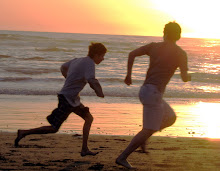 All bundled up in the wheelchair he looked like the father in Five Easy Pieces (his closest friend László Kovács shot that film). In the middle of the afternoon, we rolled him from one house to the other, up past the swimming pool, down the old driveway to the cabin with its fabulous view of the coast stretching south from Pfeiffer Pt.
All bundled up in the wheelchair he looked like the father in Five Easy Pieces (his closest friend László Kovács shot that film). In the middle of the afternoon, we rolled him from one house to the other, up past the swimming pool, down the old driveway to the cabin with its fabulous view of the coast stretching south from Pfeiffer Pt.Someone put on his head the baseball cap he always wore on the set and then his dark glasses. Someone else brought still another blanket. The sun was full on his face. I suspect it was too much; he hadn't had to endure the sun like that in months. He said nothing. I couldn't tell if his eyes were even open. Finally, after but a few minutes, I heard him whisper, "let's go back". The next day he was gone.
There was a time nearly 30 years ago when he first saw this view and imagined he'd found Shangri-La. Coming all that way from Szeged, where as a kid —his mother estranged, gone off with a lover never to return; his father away in Tangiers coaching a professional soccer team — his life had often seemed limited, lonely and drab. And here he was on top of the world, with the most beautiful light. In the end, that was the greatest attraction. Certainly it was spectacular to see the coast and the whole curvature of the earth, but it was the light that he treasured.
